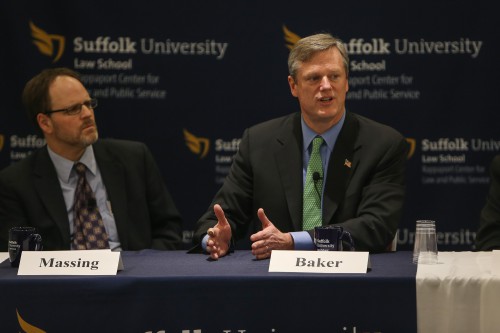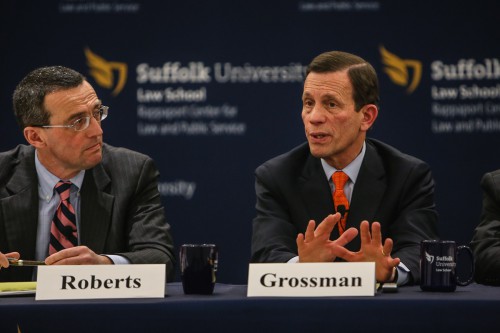Charlie Baker and Steve Grossman outlined their plans if elected governor to dozens of attendees at the Suffolk University Law School Rappaport Center last Tuesday and Thursday, highlighting issues from healthcare to casino construction.
Baker was the first Republican candidate to speak at the roundtable series on Tuesday, offering solutions that differed from the Democrats on the ballot.
“Business owners in Massachusetts tell me three things: that we have a smart workforce, but we’re a very expensive state to do business in, and that makes it difficult for them to make decisions,” Baker said, noting that rising health care costs were one of business owners’ top worries.
Baker served as Massachusetts’ administrator of health and human services, and later administrator of administration and finance in the 1990’s. He joined Harvard Vanguard Medical Associates, but quickly received a “battlefield promotion” to CEO of its parent company, Harvard Pilgrim Health Care.

Harvard Pilgrim was running yearly losses of almost $60 million, but Baker significantly changed the company’s structure and practices to return it to profit. The company’s health care plan has been rated the best in the country for 10 years.
Making health care systems more transparent and improving communication between health care providers should be a top priority Baker said, noting that patients often receive duplicate procedures when test results are easily lost. Baker acknowledged that many communities needed expanded availability to primary care.
Baker criticized the federal health care law, saying that Massachusetts should be able to keep running its state healthcare coverage program.
“I don’t know what I’m going to do if I hear from one more person saying that they sent a check to the state that was cashed, but they still don’t have coverage,” he said.
News outlets reported earlier this week that Massachusetts’ federal health connector website is currently the worst performing in the country. Baker proposed tracking the connectors’ performance through statistics and using them to find errors.
Baker, who served on the Massachusetts Board of Education for five years and is currently a trustee at a Chelsea charter school, also said that better communication between teachers and administrators can improve public schools.
“Every community in Massachusetts has great schools and underperforming schools, and people can tell you which schools in their towns are good and which ones aren’t,” Baker said.
Baker also supports modestly increasing the minimum wage, but suggests pegging it with a state-run earned income tax credit based off of the federal model. He opposes legalizing marijuana, but wants non-violent drug offenders to get better treatment instead of harsher punishment.
Addressing towns that lack sufficient transportation to Boston, Baker said that investing in better transportation was necessary, but that funding would likely be limited. He emphasized that growing local economies would bring more benefit than increasing transportation alone.
Baker criticized Governor Deval Patrick’s most recent budget, saying that it should not have taken revenue from the rainy day fund or raised taxes. He also noted that local aid sent out to towns across the Commonwealth is down 40 percent, which strains police and fire departments, among other agencies.
Nonetheless, Baker seemed optimistic about the state. He spoke fondly of his parents – his mother was a Democrat, his father a Republican – who argued about politics at the dinner table, but always tried to work out solutions.
“Their discussions were friendly … it was about working out a solution, not proving the other wrong … I saw that attitude when I began in government in 1990.” He hopes that such an attitude can improve our state government today, too.
In a discussion last Thursday, Democrat Steven Grossman, Massachusetts’ current state treasurer, focused on healthcare, improving the state economy, and reforming the state education system.
“When I talk to small business owners across our state, they talk about three challenges: burdensome regulations, rising healthcare costs, but most importantly, a lack of access to capital” to start or expand their business, he said.
During his time as treasurer, Grossman started Massachusetts’ Small Business Banking Partnership, which has lent more than $1 billion dollars to small businesses in the state, focusing on those owned by women, minorities, and veterans.
Grossman also pushed to bring taxpayer money that had been invested in foreign banks back to banks within the state.

“Massachusetts’ taxpayers’ money should be in Massachusetts banks and lent to Massachusetts’ people and businesses,” he said.
To grow the state economy, Grossman intends to draw specialized manufacturers to the state by adding relevant training programs to vocational and technical colleges’ curriculum. He estimates that such manufacturing could bring as many as 50,000 jobs to the state. He said manufacturers should open in “communities that have been left behind,” naming Springfield and Fall River, among others.
“I have a track record of working to help working people,” said Grossman, who touted his 35 years of experience running his family’s union shop started by his grandfather in 1910. He also pointed to his fight for guaranteed paid sick time for all employees and his experience in bargaining with unions and chairing the state’s pension board.
Grossman also believes that allowing casino construction in Massachusetts would bring some 15,000 jobs and net financial benefits to the state. Improving green infrastructure, like electric car-charging ports and installing renewables, would also grow the state economy, he said.
Helping students pay for college and expanding pre-k are also important goals, he said.
“We need universal pre-school in Massachusetts too. Right now there are some 25,000 kids on a waiting list for pre-k. Only 1,700 have been given a spot so far, and the next budget will reduce funding for these programs. That’s not acceptable.”
Grossman also outlined a three point plan for health care: improving the state’s community hospitals and health centers, reducing the cost of prescription drugs, and emphasizing preventative care programs. He also called Massachusetts’ shortage of primary care physicians, “particularly in rural areas … a crisis.” He has suggested underwriting doctors and nurses’ medical school debt in exchange for service in especially underserved communities.
Next week, the roundtables will continue with Attorney General Martha Coakley.













